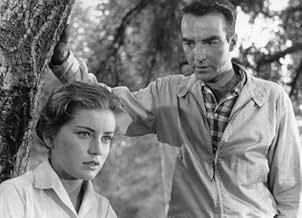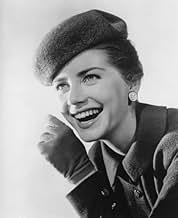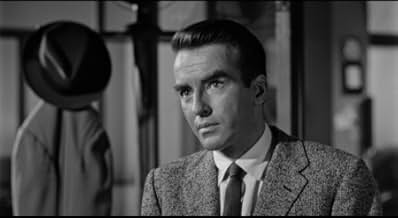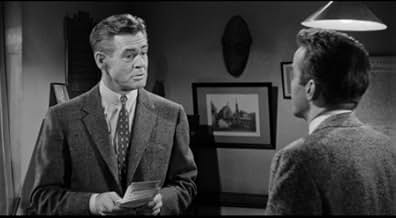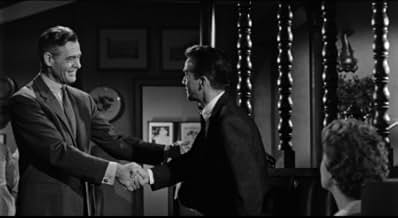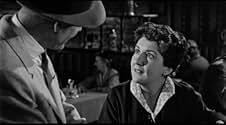VALUTAZIONE IMDb
6,6/10
1623
LA TUA VALUTAZIONE
Aggiungi una trama nella tua linguaEager for a job, journalist Adam White accepts the lowly position of columnist for the advice-giving section of the Chronicle but he often clashes with his cynical editor, Shrike.Eager for a job, journalist Adam White accepts the lowly position of columnist for the advice-giving section of the Chronicle but he often clashes with his cynical editor, Shrike.Eager for a job, journalist Adam White accepts the lowly position of columnist for the advice-giving section of the Chronicle but he often clashes with his cynical editor, Shrike.
- Regia
- Sceneggiatura
- Star
- Candidato a 1 Oscar
- 2 candidature totali
Johnny Washbrook
- Johnny Sargeant
- (as John Washbrook)
Recensioni in evidenza
Dore Schary introduced modest films noirs into MGM's technicolor pantheon, and he wrote and produced this late (1957) entry. While Nathanael West's satire was exhilaratingly brutal, just about everything about this movie seems weary and faint-hearted. Montgomery Clift, fresh from the accident which just about scuttled his career, is the cub reporter shoved into the Miss Lonelyhearts column; he's so passive and tentative -- sometimes so hard to understand -- that it's not clear whether it's method acting or the aftermath of his car smashup. Robert Ryan, usually a stalwart of these mean S.O.B. roles, delivers the lines written for the cynical editor but you have the sense he was interested only in his paycheck. Myrna Loy is trashed as Ryan's long-suffering wife, emotionally abused because of some breach of marital fidelity in the distant past. (Why doesn't she just hurl her Cinzano in his face and stalk out?) But the film starts to smoulder when Maureen Stapleton arrives (she received an Academy Award nomination for this, her debut). As Edna Doyle, frustrated wife who starts an affair with Clift, she's unforgettable without ever lurching into one-dimensional parody. She's both sympathetic and repulsive, vindictive yet confused, victim and avenger. Too bad this movie was made at a time when they thought all Nathanael West's teeth had to be pulled for public consumption; the movie vanishes with a whimper. But West is hard to film; John Schlesinger's Day of the Locust, some 20 years later, didn't do a much better job.
Nathaniel West's "Lonelyhearts" is a haunting novella about how an idealistic young man is affected by his job as an advice-giving columnist for his town's newspaper. It was intelligently adapted for the stage in the mid-50's, and the film version plainly uses that adaptation as a reference point as much as the novel itself. In ways, the film expands on the play's success, opening it up to reveal an idealized 50's picture-postcard town on the surface before centering on the insensitivity lying just underneath. Writer/Producer Schary and Director Donohue are to be commended for the atmosphere they have successfully created. It is unfortunate that they did not have enough faith in the material to resist the temptation to give it a happy ending, an ending which really is not in keeping with the events which precede it.
It must have seemed like a great idea to cast Montgomery Clift in the lead role of Adam, and a few years earlier it would have been, but this compelling actor's personal demons had so impacted upon him by this time that it is impossible not to be distracted by his unhealthy state of being. His slurred speech, unsteady gait and jerky mannerisms are entirely at odds with this character, who is said to have never had a stronger drink than a coca-cola. He is too good of an actor not to have effective moments - he works beautifully with Onslow Stevens, who plays his father - but this is a performance that holds our attention largely for unintentional reasons. Maureen Stapleton is sensational in her film debut as a writer to the column who manipulates Adam, and her performance would be right at home in a more faithful and successful version of this novel. Otherwise, this is a well-intended film which fails both to adequately reflect the novel on which it is based and to succeed on it's own terms.
It must have seemed like a great idea to cast Montgomery Clift in the lead role of Adam, and a few years earlier it would have been, but this compelling actor's personal demons had so impacted upon him by this time that it is impossible not to be distracted by his unhealthy state of being. His slurred speech, unsteady gait and jerky mannerisms are entirely at odds with this character, who is said to have never had a stronger drink than a coca-cola. He is too good of an actor not to have effective moments - he works beautifully with Onslow Stevens, who plays his father - but this is a performance that holds our attention largely for unintentional reasons. Maureen Stapleton is sensational in her film debut as a writer to the column who manipulates Adam, and her performance would be right at home in a more faithful and successful version of this novel. Otherwise, this is a well-intended film which fails both to adequately reflect the novel on which it is based and to succeed on it's own terms.
The first time I saw this film I was repelled by terrible way people treated each other, and saw no point in it. After reading some reviews I watched it again and made more sense of it. The Lonely hearts column gets letters from people with all kinds of troubles, but most of the newspaper staff make fun of then. They do not realize they have unresolved problems too. One reporter whines incessantly about not getting the assignment he wanted, unaware that attitude will never get him anywhere. Shrike had his expectations dashed after a sports injury, then his wife got drunk and had a one night stand. Despite his own infidelities he continues to emotionally abuse her. Adam made contact with Shrike though his wife and breaking him becomes part of Shrikes way of hurting his wife. Pat Doyle has a war injury and can't perform as a husband, so he beats his wife because she seeks action elsewhere. Adams own father is in prison for killing his wife and her lover. These 3 couples all had problems, but instead of trying to solve them or even just break up they chose actions that prolong the hurt and make it worse. All three men literally feel their manhood was threatened.
Despite being too old for the role of young writer, Clift's frailty makes him believable .It'snot surprising his character is breaking down under all the suffering in the Lonelyhearts letters. Physicians have a higher rate of suicide than the general public, and psychiatrists the highest. Theres a limit to how much suffering you can deal with. Justy gets all the credit for saving Adam, but she wouldn't have been able to do that if it were not for her father.
This is a man who has lost his wife and has to raise three children on his own. He doesn't take to booze or sex with random women or complain about the burden or loss. He gets up everyday, gets his boys off to school goes to work, comes home and mows the lawn and takes the whole family out to the movies. Then he tells his daughter if she really Loves Adam to forgive him his lies and go live her life. Thats real manhood. That scene could come off as soap opera, but Frank Overton has the ability to underplay scenes where there is strong emotion, coming across as real and heartfelt. Although Ryan and Stapleton are very effective in their roles, this restrained one is much more difficult.
Only later did I find out how much art had imitated life. When Frank Overton was 14 his father died, and his mother who had been the mayor's wife and a member of the Board of Education became just a widow raising 3 boys on her own and an employee of the school district.
Despite being too old for the role of young writer, Clift's frailty makes him believable .It'snot surprising his character is breaking down under all the suffering in the Lonelyhearts letters. Physicians have a higher rate of suicide than the general public, and psychiatrists the highest. Theres a limit to how much suffering you can deal with. Justy gets all the credit for saving Adam, but she wouldn't have been able to do that if it were not for her father.
This is a man who has lost his wife and has to raise three children on his own. He doesn't take to booze or sex with random women or complain about the burden or loss. He gets up everyday, gets his boys off to school goes to work, comes home and mows the lawn and takes the whole family out to the movies. Then he tells his daughter if she really Loves Adam to forgive him his lies and go live her life. Thats real manhood. That scene could come off as soap opera, but Frank Overton has the ability to underplay scenes where there is strong emotion, coming across as real and heartfelt. Although Ryan and Stapleton are very effective in their roles, this restrained one is much more difficult.
Only later did I find out how much art had imitated life. When Frank Overton was 14 his father died, and his mother who had been the mayor's wife and a member of the Board of Education became just a widow raising 3 boys on her own and an employee of the school district.
In view of some of the comments categorizing this film as unsatisfying soap opera, it all depends on what you're looking for. If what you want are excellent performances from a superior cast, then this is your kind of movie. Robert Ryan gives his typical outstanding performance as an extremely cynical newspaper editor who inflicts his particular brand of misery to the full on his long-suffering wife, beautifully portrayed by Myrna Loy. Maureen Stapleton is electrifying in her movie debut and received a well-deserved Oscar nomination for her riveting performance. Montomgery Clift's fragility works to his advantage here as an advice columnist whose sensitivity runs a little too deep. The haunted eyes and pained expressions perfectly match what the character in this situation would realistically feel and express. Overall, a nicely done, well-photographed film that is sure to hold the attention and is definitely worth the time to find and view.
Interesting newspaper tale with Montgomery Clift as interesting as ever, even though he'd had his car accident which changed his face. One of the best actors ever (along with Brando). He was great for the last 10 years of his life after his tragedy. Maureen Stapleton was heartbreakingly ignorant. Robert Ryan tough as nails. Myrna Loy beautiful and sensitive in a strange marriage and Mike Kellin adds authenticity. A great book by Nathaniel West who wrote DAY OF THE LOCUST.
I know this film bombed in '58..who cares? Too hip for the room. Definitely in the top ten of that year and Clift added another great character, even though he must have been in pain. Best performance = Maureen Stapleton (nominated).
I know this film bombed in '58..who cares? Too hip for the room. Definitely in the top ten of that year and Clift added another great character, even though he must have been in pain. Best performance = Maureen Stapleton (nominated).
Lo sapevi?
- QuizMyrna Loy arrived on set to find Montgomery Clift very nervous about meeting and working with her as he had been a big fan of hers for years. Loy was very flattered by this and the two formed a close friendship.
- BlooperIn opening scene, Adam orders ginger ale "on the rocks" - which arrives with one minuscule cube that disappears and materializes from shot to shot.
- Citazioni
William Shrike: ...I enjoy seeing youth betray their promises. It lights up all the numbers on my pinball machine.
- ConnessioniReferenced in Montgomery Clift (1983)
I più visti
Accedi per valutare e creare un elenco di titoli salvati per ottenere consigli personalizzati
- How long is Lonelyhearts?Powered by Alexa
Dettagli
- Tempo di esecuzione
- 1h 40min(100 min)
- Colore
Contribuisci a questa pagina
Suggerisci una modifica o aggiungi i contenuti mancanti

